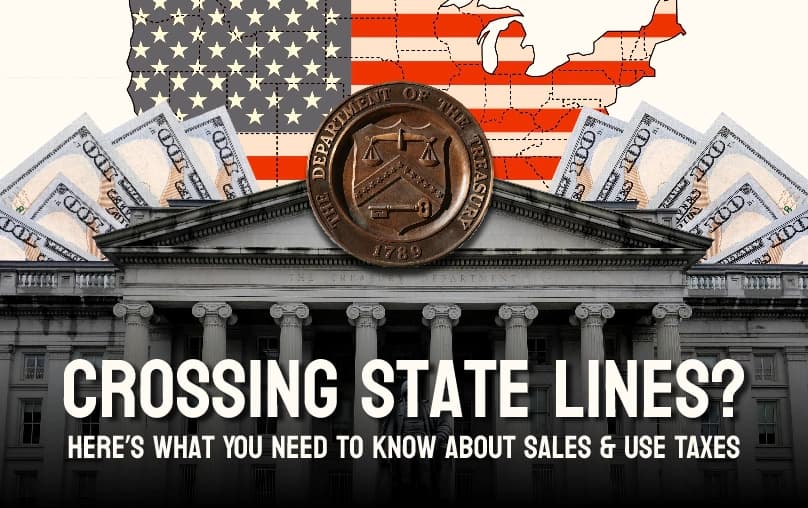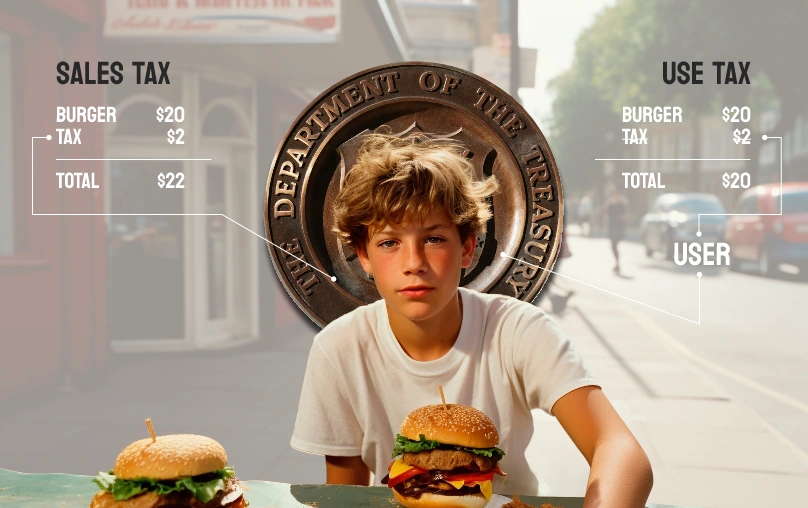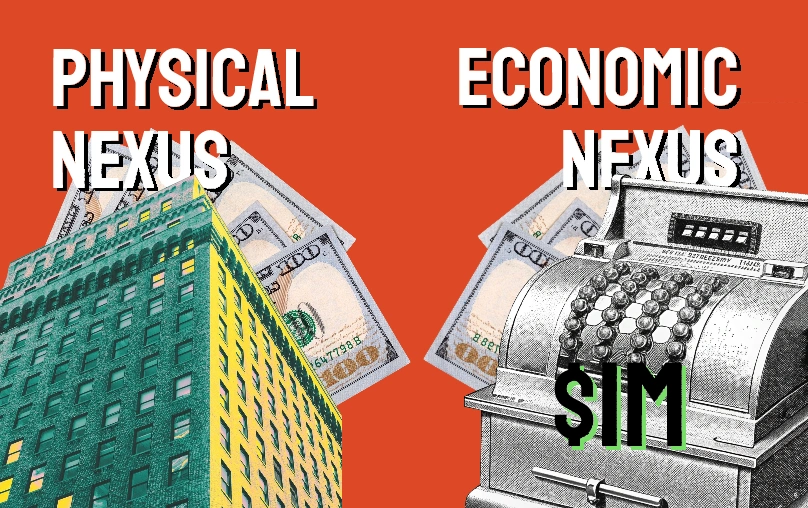
Let’s be real, running a business across state lines is exciting. More customers, more growth, more opportunities. But here’s the catch: with every new state you sell in, you also get a new layer of tax rules.
It’s a bit like being invited to 10 different family dinners everyone has their own “house rules,” and you better know them before you sit down at the table. That’s where sales and use taxes come in. And if you’ve ever tried to keep up with them across multiple states, you know it’s no small task.
Don’t worry, I’ll walk you through how an outsourced accounting firm can help you avoid headaches, fines, and endless spreadsheets.
Sales Tax vs. Use Tax: Dining Out vs. Takeout

Let’s start with the basics. Sales tax and use tax are cousins, but not identical twins.
• Sales Tax: Imagine you go to a restaurant. You order a burger, and when the bill comes, there’s a little extra added on that’s sales tax. The restaurant collects it and sends it to the government. Simple.
• Use Tax: Now imagine instead of eating at the restaurant, you order that same burger from a food truck that doesn’t charge you sales tax. Later, your state says, “Hey, you still ate that burger here. Pay us the tax.” That’s use tax.
Bottom line: Sales tax is collected by the seller; use tax is paid by the buyer.
Nexus: Your “Footprint” in a State

Here’s where things get trickier. States only tax you if you have a connection to them, called nexus. Think of nexus like leaving footprints if you leave a footprint in a state, you’re probably on the hook for taxes there.
• Physical Nexus: If you’ve got an office, warehouse, employees, or even remote staff living in a state, you’ve left a footprint. For example, if your company is based in Texas but you hire a remote worker in New York, congratulations you now have nexus in New York.
• Economic Nexus: This is newer. Since 2018, states can also tax you based on sales volume. So even if you never set foot in Florida, if you sell more than $100,000 worth of goods (or hit 200 transactions) there, you’ve got nexus.
The problem? Every state sets its own rules. New York, for example, kicks in at $500,000 and 100 transactions. Multiply that across 10 states and you see the chaos.
Sales Tax Compliance: Not One-Size-Fits-All
Okay, so you’ve got nexus. What now? You need to:
1. Register for a permit in that state.
2. Collect the right sales tax from your customers.
3. File and remit the taxes on time.
Sounds easy, right? Not so fast. Each state has its quirks:
• Some states are origin-based (you charge tax where you ship from). Others are destination-based (you charge tax where the product lands).
• Local add-ons: cities and counties can tack on extra %.
• Some products are exempt groceries, resale items, or even digital goods in certain states.
• Filing deadlines vary monthly, quarterly, or annually.
Think of it like juggling. One ball is fine. But if you’re selling in 15 states, suddenly you’ve got 15 balls in the air, all different sizes and weights. That’s where businesses often trip up.
Use Tax Compliance: The “Backstop”
Use tax is the backup system when sales tax wasn’t collected. Example:
• You buy software for your business from an out-of-state vendor that didn’t charge sales tax.
• You use it in a state where sales tax applies.
• You owe use tax.
It’s easy to miss and even harder to track yet states enforce it aggressively to protect local businesses.
Quick Takeaway
If you (or your business) bought something where the seller didn’t collect sales tax, you must report and pay use tax to the state where you used it.
• Businesses usually do this on a sales-and-use tax return.
• Individuals may do it on a consumer use-tax return or even their state income tax return.
• States find out through vendor reports, marketplace data, audits, and IRS/1099 matching.
Miss it? Expect notices, interest, and penalties.
Where and How You Pay Use Tax (Step by Step)
1. Who pays?
• Businesses buying taxable goods/services without sales tax.
• Individuals buying online or from out-of-state sellers that didn’t collect tax.
2. Where to pay?
• Businesses with nexus: On your regular sales-and-use tax return.
• Consumers/individuals: On a consumer use-tax form or annual state income tax return (depending on the state).
3. How to file & pay?
• Go to your state Department of Revenue site and search “use tax.”
• Businesses: add taxable purchases to your sales/use return.
• Individuals: file the consumer use-tax form or report on income tax return.
• Pay online (credit/debit/e-check) or by mail.
Example:
You buy $10,000 of cloud-based software. No sales tax was charged. Your state rate = 6%.
• Use tax owed = $600.
• If registered: report $600 on your next sales/use return.
• If not registered: file the consumer use tax form (or report on state income tax return) and pay $600.
The Audit Risk: Why Compliance Matters
If you think “eh, I’ll just wing it,” here’s the reality: states are cracking down harder than ever. Audits are rising, penalties sting, and missing deadlines could cost thousands.
It’s like skipping insurance fine until something goes wrong.
Strategies for Staying Compliant
• Track nexus carefully (sales & employees per state).
• Keep a compliance calendar (deadlines creep up fast).
• Use automation tools (Avalara, TaxJar, etc.).
• Stay updated on rule changes.
• Do your own audits before the state does.
How Outsourced Accounting Firms Help
Multi-state taxes are like driving across the country every state has its own rules, road signs, and tolls. An outsourced accounting firm is your GPS:
• Expertise across states → They know every rule, so you don’t have to.
• Registration & filing → They handle the paperwork and permits.
• Audit protection → They keep your records clean if the taxman comes.
• Scalability → Whether you’re in 3 states or 30, they grow with you.
• Tech + people → Automated software plus human oversight for accuracy.
Instead of stressing about nexus thresholds or chasing down notices, you focus on growth. They handle the taxes.
Final Thoughts
Multi-state sales and use taxes don’t have to be a roadblock. Yes, rules vary and yes, they’re messy. But with the right partner, you can expand with confidence.
Think of it this way: you keep driving the car (your business), while the outsourced accountants handle the GPS, traffic updates, and toll payments. Together, you’ll get where you’re going faster, safer, and with fewer detours.

Shekhar Mehrotra
Founder and Chief Executive Officer
Shekhar Mehrotra, a Chartered Accountant with over 12 years of experience, has been a leader in finance, tax, and accounting. He has advised clients across sectors like infrastructure, IT, and pharmaceuticals, providing expertise in management, direct and indirect taxes, audits, and compliance. As a 360-degree virtual CFO, Shekhar has streamlined accounting processes and managed cash flow to ensure businesses remain tax and regulatory compliant.
You might also like:
- What Is a 1099 Form? Types, Deadlines & Who Needs to File (2026 Guide)
- Getting Your PayPal Taxes Right: The Seller’s Guide to Reporting, Forms & Smart Record Keeping
- How the IRS Helps When a Natural Disaster Turns Your Financial Life Upside Down
- Is Social Security Really Tax-Free Under the OBBBA?
- What Happens If You File the Wrong IRS Form? Real Penalties, Delays & How to Fix It Fast
Listen Exclusive Podcast On

